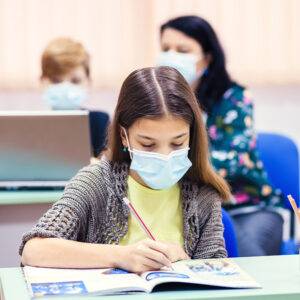There’s been a drop in kindergarten registrations for Pennsylvania schools, and one observer thinks it points to something very basic.
“Parents should be empowered to make the best decisions for their kids,” says Colleen Hroncich of the Harrisburg-based Commonwealth Foundation.
This, adds Hroncich, should apply during times of pandemic or no pandemic.
As in other states, schools across Pennsylvania have been closed for in-person learning, and many districts have yet to return to normal. Meanwhile, many private schools remained open, drawing interest from parents who feared the impact of classroom lockdowns on their children’s educations.
“Sadly, our current education system pushes back against parents,” adds Hroncich, a mother of four whose children have experienced public, private, cyber, and home education. “If we had a program like Education Savings Accounts (ESAs), parents who kept their children home this year could have received funding to help them buy curriculum, hire tutors, or pay for their internet access.”
Hroncich believes the COVID-19 crisis has “shown us exactly why we should adopt this sort of flexible options.”
State Sen. Judy Ward (R-District 30) has introduced legislation for several years now that would create Education Savings Accounts.
“With the coronavirus, there is more need than ever for flexible education options since schools closed and families are bearing increased expense from at-home learning,” Ward said in July 2020 upon introducing her legislation. “These ESAs will help students, regardless of the type of school they attend, make up for lost schooling, and give parents some vital financial help to get their children the educational resources they need.”
Ward’s bills would allow for ESAs to be spent only on education-related needs such as tuition and curriculum.
That may sit well with some Pennsylvanians, but what about the majority of people in the state?
“Pennsylvanians believe parents should be able to choose the school that works for their children,” says Hroncich.
Pointing to a poll by Commonwealth Foundation in May 2020, Hroncich says 73 percent of voters in Pennsylvania support Education Savings Accounts, while 66 percent support charter schools. And 46 percent would choose private school if possible.
“We believe every child is unique, and one size does not fit all when it comes to education,” wrote Hroncich in a report based on the polling. “All children deserve to be educated in the environment that works best for them.”
The average cost of tuition at a private school in Pennsylvania is around $11,000. The average in a Catholic school is $4,500 to $8,000, depending on whether it is elementary or high school.
Teachers unions and their allies believe Education Savings Accounts do more harm than good. While the PSEA declined to respond to requests for comment, the union has spoken out repeatedly against ESA’s, claiming they “siphon precious monies to unaccountable private educational entities.”
If you ask Hroncich, Pennsylvania taxpayers are getting a return on state investments in public education.
“Private schools have largely been open for in-person learning and a lot of the public schools, even at the level of state funding per student, I personally would not say that we get our money’s worth.”
Pennsylvania spends more than $18,000 per student in public school.
In terms of national opinions on Education Savings Accounts, a poll from EDChoice and Morning Consult finds around 75 percent of Americans support ESAs after being provided with the following description:
“An ‘education savings account’ in K–12 education – often called an ESA – establishes for parents a government-authorized savings account with restricted, but multiple uses for educational purposes. Parents can then use these funds to pay for: school tuition; tutoring; online education programs; therapies for students with special needs; textbooks or other instructional materials; or to save for future college expenses.”

